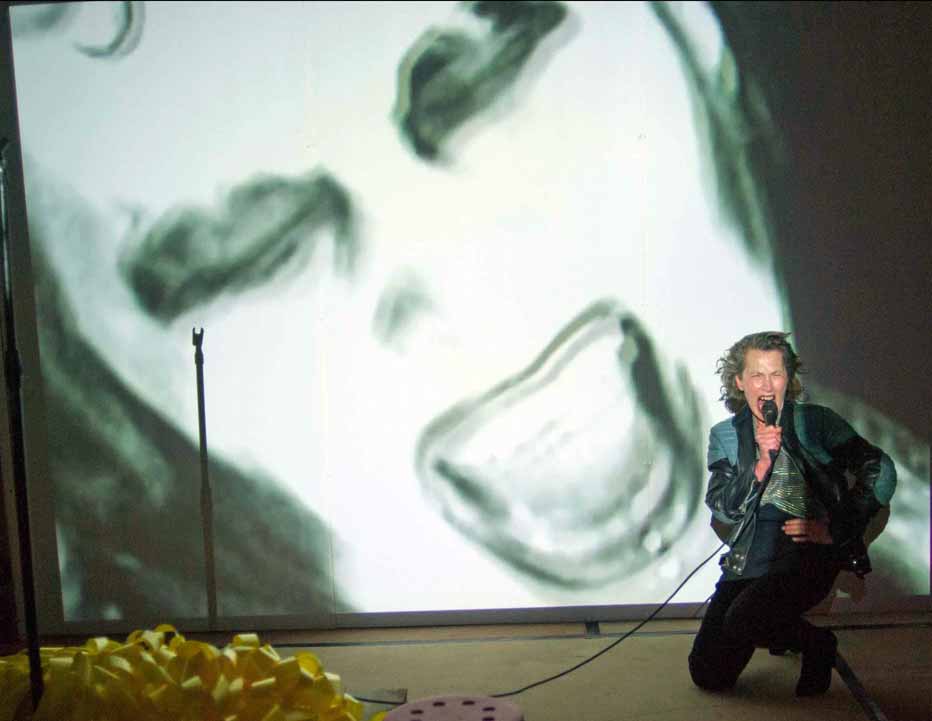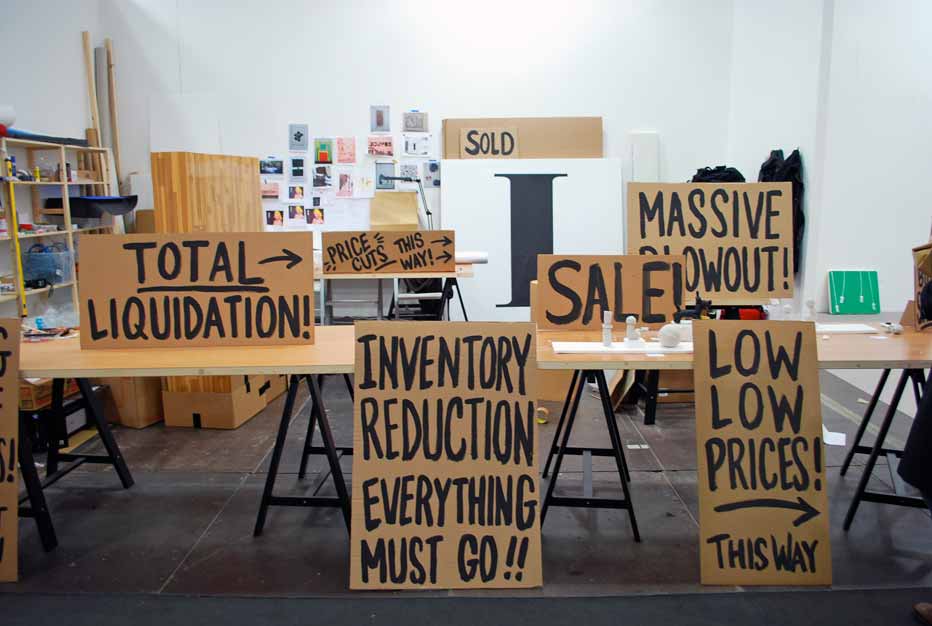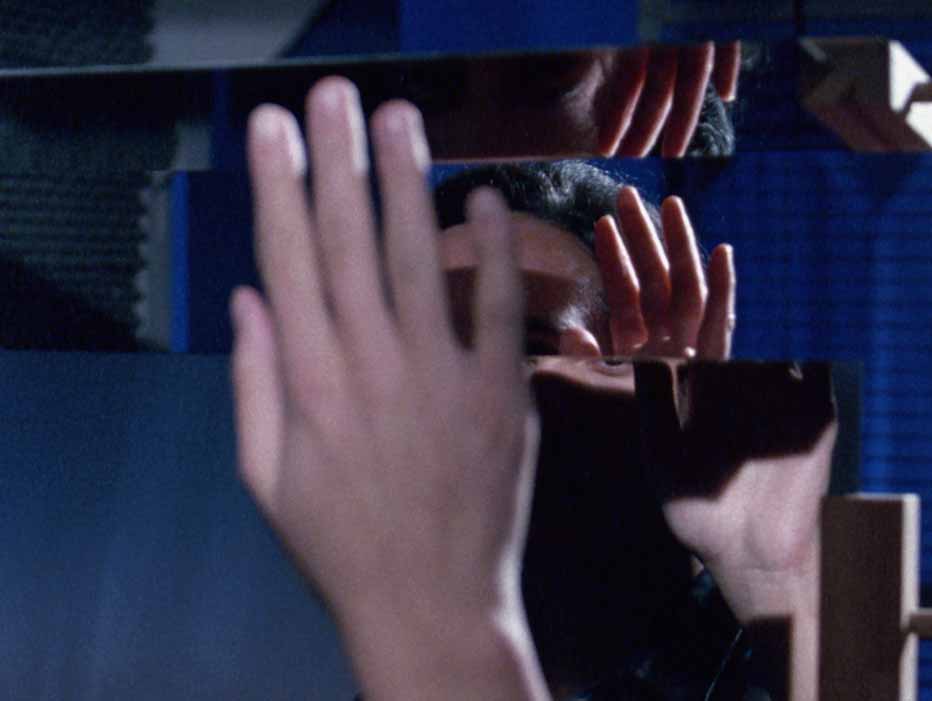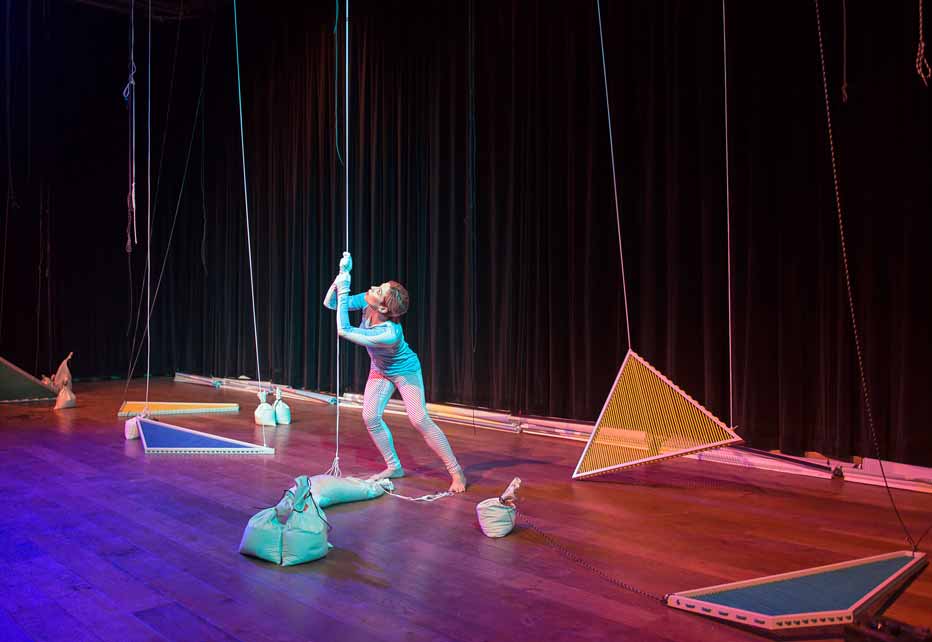


Interviewed by Rob La Frenais
Morgan Quaintance
Lizzie Homersham
Profile by Isobel Harbison
Buy Now – select:
Want to read this right now?
Get instant access to the entire back catalogue via Exact Editions from only £8.99!

Anne Bean Moody and the Menopause – A duet between AB 1974 and AB 2014 performance at Matt's Gallery
Anne Bean interviewed by Rob La Frenais
The London-based artist whose family immigrated to England from Russia discusses naming, identity, place and memory in relation to her work, and how we are all each other's archives and legacies.
The audience was inevitably caught up in the mayhem, running for cover, not knowing which way to go, what to see, what floor would give way, what glass would fly, what staircase was safe.

Stephanie Syjuco COPYSTAND: An Autonomous Manufacturing Zone – Liquidation Sale 2009 Frieze Projects commission
Morgan Quaintance argues that art's relationship with private finance comes at a price
Pandering to the real or imagined demands of private finance distorts the art world, silencing dissent and stifling politically or socially engaged art in favour of consensus and what is known in the trade as 'investment grade art'.
Art offers a kind of absolution by association whereby close proximity to art renders the investor a supporter of liberal and progressive ideals by association, whatever their actual political or ideological commitments and conduct may be.

Daria Martin At The Threshold 2014-15
Lizzie Homersham tackles gendered issues surrounding ideas of empathy and autism
In the work of artists such as Leah Clements, Mark Leckey and Daria Martin, and writers such as Chris Kraus, a spectrum of emotional and psychological conditions are explored, raising the question of whether an over-abundance of empathy is being used as an excuse for complicity.
Perhaps today, empathy and autism are being opted for over schizophrenia as ways of navigating the murkiness of a world in thrall to some of the worst politics, some of the most catastrophic events, some of the worst institutions of capitalism.
From the Back Catalogue
Moon Child Mark Leckey interviewed by Jennifer Thatcher
The ugly rhetoric of the EU referendum campaign, which was characterised by scaremongering and exaggeration, drowned out the positive voices of artists and others who have much to gain and contribute to both UK and European culture. In the aftermath there will be much to do to heal wounds opened up by the negative campaigning, bringing to mind the words of murdered MP Jo Cox:
'While we celebrate our diversity, what surprises me time and time again ... is that we are far more united and have far more in common with each other than things that divide us.'
Jailed Russian performance artist Pyotr Pavlensky gives the prize money he received for his 'creative dissent' to armed guerrillas; the Hong Kong Development Corporation pulls a public artwork it commissioned after the artists revealed the anti-Beijing sentiment behind the work; the leadership crisis at De Appel in Amsterdam has led to a recommendation that its state funding be terminated; the number of students taking arts GCSEs plummets precipitously; MIMA wins the Contemporary Art Society's Collections Fund award but the remodelled prize comes with the stipulation that the £50,000 must be spent at Frieze London; the latest news on galleries, appointments, prizes and more.

Melissa Gordon Fallible Space 2016 performance Bluecoat Gallery, Liverpool
Isobel Harbison on a London-based artist who forensically examines the legacies of abstract painting through politics, blow-ups and performance .
Melissa Gordon uses painting discursively, to examine the gestures, choreographies and supports of abstraction: who, she asks repeatedly, gets to be abstract?

Mikhail Karikas Ain't Got No Fear 2016- video
Whitstable Biennale
Chelsea Space, London
Richard Grayson
Wilkinson, London
Martin Holman
various venues, Limerick
Chris Clarke
various venues, Zurich
Aoife Rosenmeyer
ICA, London
Jamie Sutcliffe
Castlefield Gallery, Manchester
Tom Emery
various venues
Sophia Phoca
various venues
Saim Demircan
Breese Little, London
Deborah Schultz
Spacex, Exeter
Lizzie Lloyd
Royal Fort Gardens, Bristol • The Lowry, Manchester
Lizzie Lloyd
MACBA • Fundació Gaspar
Luke Skrebowski
David Barrett on two alternative surveys of the artists' book
While it is common for literary books to be described as unfilmable, perhaps artists' books are unwritable.
Peter Suchin encounters competing interpretations of art's purposes
There are many interesting things about this book and the procedures it records but its author's notion of realism and its critical efficacy are optimistic and fanciful at best.
Henry Lydiate on the looming question of (self) regulation
There is strong agreement about serious problems undermining trust in and credibility of the art market, including top price manipulation, conflicts of interest, lack of transparency, secret commissions and authenticity.
The updated events and exhibitions calendar can also be viewed online.
Art Monthly's exhibition listings can be viewed online.